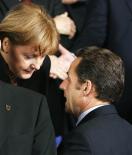BRUSSELS (Reuters) – European Union leaders were set to give formal blessing on Friday to a French proposal for a Mediterranean Union to boost ties with the bloc’s southern neighbours, a draft final statement showed.

But the plan presented by French President Nicolas Sarkozy and German Chancellor Angela Merkel to a 27-nation EU summit is a pale shadow of the grand design initially proposed by Paris.
“The European Council approved the principle of a Union for the Mediterranean which will include the member states of the EU and the non-EU Mediterranean coastal states and be an upgrade of the Barcelona process,” the draft seen by Reuters said.
EU leaders are due to approve it at the end of a two-day summit on Friday.
They will invite the executive European Commission to propose detailed arrangements for launching the new Union at a summit in Paris on July 13, after months of fierce resistance by Berlin forced Paris to drop the most controversial features.
The concept has shrunk from an international forum grouping only states with a Mediterranean coastline and involving nine new agencies and a bank, to a mere regular summit of EU and Mediterranean countries with a joint presidency — which may yet be dropped — and a small secretariat.
Merkel said the original plan would have split the EU and siphoned off common funds for the benefit of a few members and their former colonies.
But Sarkozy told a midnight news briefing: “I never had the idea of excluding any EU states…I never regarded it as a rival to the EU.”
He acknowledged that negotiations had been difficult but insisted that relations with Merkel had not been strained over the episode, saying they remained “excellent”.
NO HARM
While no one vetoed the plan for closer cooperation with 12 south and east Mediterranean states some leaders were grudging.
Austrian Chancellor Alfred Gusenbauer said the idea “doesn’t do any harm” but added: “What matters to us is that it’s not some special grill party for a few member states.”
In practice, the Union for the Mediterranean will be little more than a new political umbrella over the existing Euro-Mediterranean partnership, launched in 1995 in Barcelona.
That process of trade, cultural and political cooperation has yielded disappointing results partly due to the lingering Israeli-Palestinian conflict, but also because most of the Mediterranean partner states have opaque, authoritarian governments poorly equipped to absorb EU funds.
Progress towards the original aim of a Euro-Mediterranean free trade area by 2010 has been slow, with the EU’s southern states insisting on keeping out rival farm produce.
Over the years, the focus has shifted from providing multilateral support for Israeli-Palestinian peace process to combating terrorism and illegal migration.
Spanish Secretary of State for European Affairs Alberto Navarro said the proposed rotating co-presidency would not work because Arab states would want to avoid it going to Israel, and EU foreign policy chief Javier Solana voiced a similar concern.
At Germany’s insistence, there will be no new EU money beyond the funds allocated for the Barcelona process. France hopes to tap private sector funding in addition. Sarkozy said he expected resources of up to 14 billion euros (10.7 billion pounds).
French diplomats say they hope the Paris summit will launch a handful of new projects such as a clean-up of the polluted Mediterranean Sea and joint efforts to combat climate change and fight forest fires.
(Additional reporting by Mark John; writing by Paul Taylor; editing by Philippa Fletcher)
Fri Mar 14, 2008 8:35am GMTBy Ingrid MelanderSource: Reuters